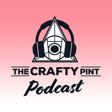
Grainstock 2025
"We're all massive grain users – bakers, brewers, distillers – so it's so good to get to connect with them."
Grainstock was a first-of-its-kind industry gathering and beer festival celebrating grain, agriculture, brewing, distilling and baking under the one banner.
Held at Voyager Craft Malt’s home at the Whitton Malt House over three days, it brought diverse yet linked industries together for farm tours, networking, and a symposium exploring the opportunities, challenges and future for farmers and businesses that rely on grain.
During the conference, Will and Craig sat down with three guests to chat about their respective backgrounds, what brought them to Whitton, and their experience at the conference.
First up, we have Caolan Vaughan, head brewer at Stone & Wood, who has been overseeing the introduction of regen and organic ingredients at the brewery. He’s followed by Phil Stevens, who used to lead brewing at The Welder's Dog and is now focused on native grains, before we’re joined by distiller and CIBD board member Lisa Macrae.
Ahead of those interviews, James and Will discuss Lachy Crothers’ new fresh AF beer project, the return of Ballarat Bitter to its founding family's hands, and Rehn Bier’s move into the Old Mill Brewery with some Barossa mates. We also unveil the latest Have You Done A Rallings? winner.
Start of segments:
- 17:42 – Caolan Vaughan
- 27:59 – Phil Stevens
- 39:19 – Have You Done A Rallings?
- 43:07 – Lisa Macrae
To find out more about featuring on The Crafty Pint Podcast or otherwise partnering with The Crafty Pint, contact craig@craftypint.com.
